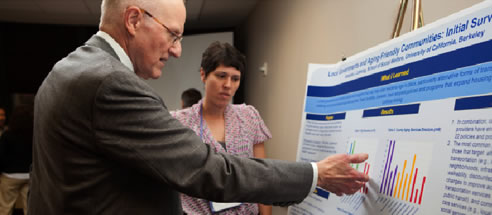Strategy 1
Prepare Doctoral Students to Focus on Aging
 (Above) Dr. Lubben, Director of the Hartford Doctoral Fellows Program, with Amanda Lehning, MSS, a Doctoral Fellow attending the School of Social Welfare, University of California, Berkeley, at the Annual Meeting of The Gerontological Society of America.
(Above) Dr. Lubben, Director of the Hartford Doctoral Fellows Program, with Amanda Lehning, MSS, a Doctoral Fellow attending the School of Social Welfare, University of California, Berkeley, at the Annual Meeting of The Gerontological Society of America.
Based on the experience with the Faculty Scholars program, it became evident that a companion program aimed at doctoral students of social work was also needed. “Today’s doctoral students are tomorrow’s faculty,” says James Lubben, PhD, The Louise McMahon Ahearn Chair, Boston College, and Director of the Hartford Doctoral Fellows Program. “The only way to attend to the severe shortage of doctorally-prepared social work faculty who will teach the next generation is to cultivate the best and brightest students to pursue an academic career and to be committed to developing programs that focus on caring for older adults and their families.”
In 2000, the Hartford Foundation provided the first grant of $2.4 million to the Gerontological Society of America to establish the Hartford Doctoral Fellows in Geriatric Social Work program (www.gswi.org/programs/hdf.html). Altogether the Hartford Foundation has invested $10 million in this program which provides dissertation support and professional development opportunities to a select group of social work doctoral students. From 2005 to 2009 the program also included a pre-dissertation component.
“The Doctoral Fellows program identifies doctoral students with the potential to become faculty leaders in geriatric social work and gives them the tools to launch a successful academic career,” says Dr. Lubben. The Faculty Scholars program provides additional training and mentorship to accelerate their career trajectory so they receive tenure and move into strong leadership roles.
The goal of the Hartford Doctoral Fellows program is to recruit, sustain, and prepare talented doctoral students in geriatric social work. Doctoral students in social work face several challenges, which the program attempts to address.
For example, doctoral education is expensive, extramural grant funding for doctoral education in social work is limited, and mentoring of doctoral students is often short-changed.
Because doctoral students need time to study and to conduct research unencumbered by the need to work part-time, the Hartford Doctoral Fellowship provides a dissertation grant of $50,000 over two years. With this support, Doctoral Fellows can focus on becoming outstanding scholars. Doctoral Fellows gain knowledge, form bonds with colleagues in their cohort, and meet influential leaders in the field. The program also focuses on developing leadership skills.
“We want to give our Doctoral Fellows an edge, so they can secure a first-rate academic position from which they can grow,” says Dr. Lubben. “Equally important, we give them the skills so they can hit the ground running and advance very quickly on the road to tenure.”
The Doctoral Fellows Pre-Dissertation Award Program aimed to expose more doctoral students to gerontological social work research. In partnership with the Association for Gerontology Education in Social Work, up to 80 students in the second or third year of their doctoral program were brought to special sessions at annual scientific meetings. Awardees met leading researchers and participated in workshops on dissertation proposal and grant writing.
A Decade of Progress in Preparing Doctoral Students
An evaluation of the accomplishments of the first six cohorts of Doctoral Fellows—for whom sufficient time has passed for meaningful follow up—found that 96 percent of Fellows completed their dissertations, compared to only 71 percent of doctoral candidates not participating in the program. Fifty-nine percent of Doctoral Fellows from the first six cohorts hold tenure track positions, almost twice as many as a comparable group of doctoral students (34 percent) not participating in the program.
“We’ve made great progress with the Doctoral Fellows program,” says Dr. Lubben, “but there’s still work to be done.”
The number of social work doctoral graduates seeking full-time academic appointments remains less than the current demand for new faculty. The shortage is likely to worsen with the imminent retirement of faculty members in the Baby Boom generation. This creates an opportunity for the Hartford Doctoral Fellows program. “We can train people to take these positions and the people we train are dedicated to aging,” says Dr. Lubben. “This can create a paradigm shift in the whole field.”
Next: Cultivating Academic Leaders: Profile of Daniel S. Gardner, PhD, LCSW ›
